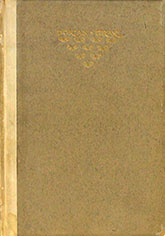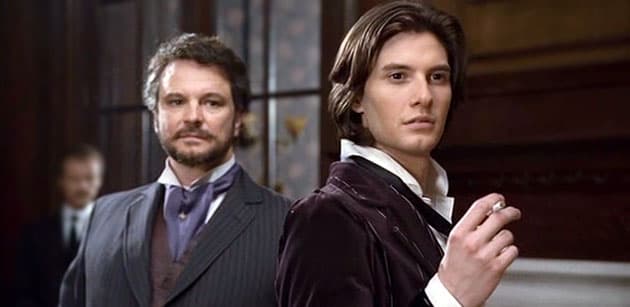The Picture of Dorian Gray
Critique • Quotes • At the movies
1945, 2009
 First edition
First editionFirst publication
1890, novella in Lippincott's Monthly Magazine
First book publication
1891
Literature form
Novel
Genres
Literary, fantasy, horror, philosophical fiction
Writing language
English
Author's country
Ireland
Length
Approx. 78,500 words

Colin Firth, left, is the conflicted Lord Henry who comes to regret leading Dorian Gray (Ben Barnes) astray.
Tortured souls
Dorian Gray (2009): Film, 112 minutes; director Oliver Parker; writer Toby Finlay; featuring Ben Barnes, Colin Firth, Ben Chaplin, Rachel Hurd-Wood, Rebecca Hall, Emilia Fox
Put this one in the sexual category, with a side of horror. British-style.
First, there's the sumptuous colour, rich in earth and flesh tones for the sensual indoor scenes, and cool in shades of blue for the London night scenes of mist and mayhem. In this it reminds me a bit of the Hammer Studio films of the 1950s and 1960s that offered horror arising from psychological drama and implicit sexuality.
Except there's nothing implicit in 2009's Dorian Gray. It's all out there. The titular character's descent into unbridled hedonism is illustrated with seductive scenes of squirming bodies, often naked except for bizarre masks. And the central murder is played out bloodily and has our sweet-faced protagonist disposing of dismembered body parts. In fact, the movie opens with this scene before jumping back a year to when the innocent bumpkin, Dorian Gray, first arrived in the metropolis.
It is again a little disappointing that the best-known actor in the film takes the supporting Lord Henry role. But much as fans might yearn to see him as the explorer of sensual delights, the ever-popular Colin Firth really is too old for that role. He does make an interesting Lord Henry though. He gives all the Wildean quips a droll delivery, sounding more like a philosopher than an entertainer, and he plays up the jaded gentleman's conflicted nature more than other adaptations or the novel.
The story shows him a changed man by the end—devoted to his daughter who, to his horror, takes up with his former protégé.
Ben Barnes is savaged by some critics as giving a shallow performance as Dorian Gray, being just a pretty boy, and so on. He is even compared negatively to Hud Hatfield in the 1945 film! For me though, he's perfect, everything Hatfield wasn't. Yes, he is incredibly attractive—he's supposed to be incredibly attractive, which explains why Basil Hallward wants to paint him as representing a new kind of man and why everyone from Lord Henry down is drawn to him. And yes, he is shallow—he's supposed to be shallow. But he also conveys the struggle going on inside his shallow self: the tug-of-war with Lord Henry's influence, his inner panics, his guilt over his victims, his attempts to reform himself.
Trailer for Dorian Gray, the 2009 film adaptation of The Picture of Dorian Gray.
The film is also attacked for its endless bedroom romps and orgy scenes. They are justified to some degree. They fully demonstrate the extent of Dorian's promiscuity and his unfaithfulness to all friends and lovers, as could not be done in Wilde's time or in the early days of movie-making. But it's agreed the scenes do go on too long and become tiresome.
It's a good plot move also to have the young man disappear from London after the murder and return two decades later. It skips having to have characters narrate what he's up to in town all that time and gives us the opportunity to see the reactions of his circles when he comes back looking exactly the same as when he left, although they have all visibly grown older.
This film features many other departures from the novel (and previous adaptations), such as cutting the subplots of Dorian blackmailing a former friend to get rid of the corpse and of Sibyl Vane's brother James dying in a hunting accident, or adding Dorian seducing Sibyl with a lie and that affair with Lord Henry's daughter.
Some of the changes enhance the larger story and others don't.
But Dorian Gray is a serious attempt to recreate Oscar Wilde's story for a twenty-first century audience. If it doesn't entirely succeed, it is at least an interesting failure.
— Eric
Critique • Quotes • At the movies
1945, 2009

